|
|
|
Sort Order |
|
|
|
Items / Page
|
|
|
|
|
|
|
| Srl | Item |
| 1 |
ID:
158078


|
|
|
|
|
| Summary/Abstract |
In mainstream scholarship, David Ben-Gurion is described as one of the main supporters and primary advocates of the policy of encouraging mass Jewish immigration to Israel (aliya) in the 1950s. The Zionist movement had two different motives for supporting aliya: Diaspora Jews’ need for a safe haven (which would require mass aliya), and the need to build a solid and stable Jewish society in mandatory Palestine/Israel (which would require selective aliya).
|
|
|
|
|
|
|
|
|
|
|
|
|
|
|
|
| 2 |
ID:
158083
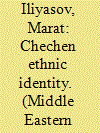

|
|
|
|
|
| Summary/Abstract |
This article critically assesses the ostensible transformation in Chechen ethnic identity. Journalists and scholars who came to this conclusion based their claim on obvious changes in Chechen behavior. The brave and irreconcilable resistance the nation demonstrated during the First and the Second Russo-Chechen Wars of 1994–1996 and 1999–2009, respectively, was replaced by a submissive and loyal stance with regard to the new authorities and recent enemies. This article investigates whether such a change in behavior reflects a corresponding change in ethnic identity. This article asserts that ‘non-Chechen’ behavioral models do not signify changes in Chechen ethnic identity by presenting and analyzing Chechen narratives concerning the question. In summary, this article concludes that the ethnic identity of the nation remained mainly untouched. This conclusion is supported by the observed continuity of Chechen resistance, which has always been driven by cherished values such as freedom.
|
|
|
|
|
|
|
|
|
|
|
|
|
|
|
|
| 3 |
ID:
158077


|
|
|
|
|
| Summary/Abstract |
At the start of the First World War the Committee of Union and Progress (CUP), the ruling party of the Ottoman Empire, used numerous means to ensure that the Kurdish leaders remained allies. Interpretations of Jihad became a major tool for recruitment of Kurdish soldiers by all sides in the war, including the Ottomans, Russians, British and Kurds, though the tactic had limited success. During this period, several religio-political leaders emerged among the Sufi orders in Kurdistan and created their own regiments that fought alongside the Ottomans. Other leaders sided with Russian and British forces. Among those leaders that did not support the Ottomans, Sayyid Taha II arose as a rational, yet unorthodox political figure. His political maneuvering proved that the frontiers were fragile, fluid and impermanent. The present study aims to show that in the context of the First World War the Kurdish leaders of the time, primarily Sayyid Taha II, vis-à-vis the non-religious notables in Istanbul, were transformed into political leaders by their experiences during and after the war.
|
|
|
|
|
|
|
|
|
|
|
|
|
|
|
|
| 4 |
ID:
158076
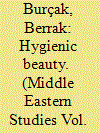

|
|
|
|
|
| Summary/Abstract |
This article examines discussions on Ottoman-Muslim female beauty, health and hygiene in the Hamidian Era (1876–1909). Analysing the Hamidian popular press, advice literature and textbooks for girls, the article argues that these discussions were more than just female ‘physical culture’ debates, involving larger issues of late-Ottoman regeneration. Wars, epidemics, massive migration movements and fluctuations in population pushed the late-Ottoman state to create healthy generations as a productive force to secure the Empire's future in general and the Ottoman Muslim population's welfare in particular. Maintaining good health expanded from a religious obligation into now also becoming a patriotic duty incumbent upon Ottoman subjects knowing and applying modern hygienic principles. Focus on Ottoman-Muslim women's procreativity shifted female beauty into a public discussion, now defined as a reflection of health. The new hygienic beauty discourse distinguished between preserving vs. harming one's health in the face of Western fashions and cosmetics: healthy beauty mirrored a ‘good complexion’.
|
|
|
|
|
|
|
|
|
|
|
|
|
|
|
|
| 5 |
ID:
158081
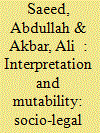

|
|
|
|
|
| Summary/Abstract |
Since the advent of the Islamic revolution in Iran in 1979, radical changes have taken place in the views of many Iranian scholars regarding the nature of religious belief. In particular, the issue of the compatibility or incompatibility of Islam's socio-legal precepts and the challenges of time and space have become a crucial matter for numerous Iranian intellectuals. This paper discusses how three prominent Iranian intellectuals of the post-revolutionary era, namely Mostafa Malekian, Mohsen Kadivar and Hasan Yousefi-Eshkevari, have put forward arguments in favor of the contingent nature of the Quran's socio-legal passages. The paper argues that these scholars challenge the notion of the immutability of the Quran's socio-legal texts, claiming that they could be applied differently depending on the specific time and place. In this sense, the paper establishes the groundwork for showing how these scholars have re-examined traditional understandings of religion in light of the new challenges that are arising in the modern world.
|
|
|
|
|
|
|
|
|
|
|
|
|
|
|
|
| 6 |
ID:
158082
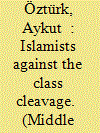

|
|
|
|
|
| Summary/Abstract |
One of the central characteristics of current Middle Eastern politics is the weakness of class-based political organizations. While structural explanations of this pattern abound, hegemonic struggles of Islamists to erode the class cleavage have so far been largely overlooked. In order to bring this perspective into the literature, this article studies discourses, affects and policies promoted by the Islamic trade unions confederation of Turkey, Hak-İş. After the introduction, I first demonstrate that the identity of Hak-İş has consistently been based on a fantasy of social cohesion and aversion to class-based politics. Building on this, I detail how Hak-İş has developed new economic and political practices, in a deliberate effort to overcome class-based unionism. Finally, I argue that the role of Hak-İş has evolved into representing workers' interests within the framework of the corporatist regime built by pro-Islamic AKP government.
|
|
|
|
|
|
|
|
|
|
|
|
|
|
|
|
| 7 |
ID:
158084
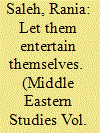

|
|
|
|
|
| Summary/Abstract |
This article examines the issues underlying the downfall of the Mubarak regime from the perspective of Egyptian cartoonists. A total of 2734 political cartoons published in five leading newspapers between January 2010 and February 2011 are analyzed. Because they form a significant part of the cultural context within which these cartoons are created, popular political jokes are also referenced. The study identifies political stagnation, domestic issues and corruption as the three most significant issues that paved the road to the fall of Mubarak.
|
|
|
|
|
|
|
|
|
|
|
|
|
|
|
|
| 8 |
ID:
158080
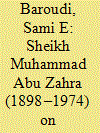

|
|
|
|
|
| Summary/Abstract |
The literature on Political Islam has not devoted ample space to the intellectual contributions of contemporary moderate Islamists. This article attempts to rectify this by examining the international relations discourse of a twentieth-century Egyptian religious scholar: Sheikh Muhammad Abu Zahra. Despite Abu Zahra's prominence in the Islamic world, his writings have received scant attention from academics. The article provides a close reading of his three principal works on international relations: al-ʿAlaqat al-Duwaliyya fi al-Islam, Nazhariyat al-Harb fi al-Islam and al-Wihda al-Islamiyya; as well as a fourth work with a significant bearing on the subject: al-Mujtamaʿ al-Insani fi Dhil al-Islam. It contends that Abu Zahra's international relations discourse is part of a more than a century-old tradition of theorizing on international relations that dates back to the religious reformers Jamal al-Din al-Afghani and Muhammad Abdu. Accordingly, Abu Zahra is treated here as an exemplar of what I refer to as the moderate and reformist school in contemporary Islam, in contradistinction to the radical school that is associated with salafi-jihadist figures and movements. A close analysis of Abu Zahra's international relations discourse thus provides penetrating insights on one pivotal, albeit understudied, dimension of this reformist/moderate current in contemporary Islam: its perspectives on international relations.
|
|
|
|
|
|
|
|
|
|
|
|
|
|
|
|
| 9 |
ID:
158079


|
|
|
|
|
| Summary/Abstract |
The establishment of the State of Israel was a watershed moment in the history of the General Zionists movement. The ending of the British Mandate – characterized by its responsiveness to private enterprise – symbolized the denouement of a regulatory strategy era as an exclusive modus operandi for the general organizations. The transfer of power to a participatory Jewish democracy, whereby independent institutions drew on electoral support, required that bourgeois and petit-bourgeois leaders relinquish their reservations about the political-partisan game. For the first time, they sought to gain ascendancy over a political party in the hope that it would stand up for the rights and interests of the middle class. This article will analyze the formation process of the center party and its attempt to become a significant factor in Israeli society.
|
|
|
|
|
|
|
|
|
|
|
|
|
|
|
|
|
|
|
|
|